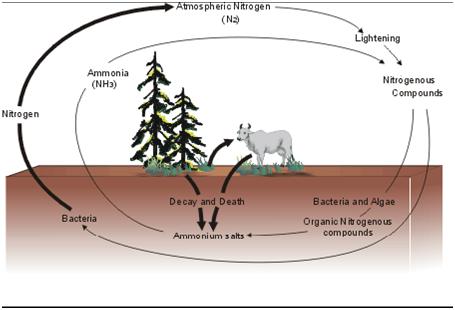Decomposers are saprophytes which feed on faeces and dead organisms. Many bacteria and fungi are decomposers/ they secrete enzymes onto their food. These enzymes break down complex organic compounds of the food like carbohydrates and proteins in simpler components with the release of energy.
Decomposers absorb only a small amount of energy and nutrients thus produced for their own use. Most of the energy is lost as heat and the remaining materials are released into the surrounding soil, air and water.

The inorganic compounds released during decomposition include gases like CO2, H2S and water vapours and salts like nitrates, sulphates, phosphates and potassium ions. These are reused by green plants during photosynthesis and other synthetic processes.
Nitrogen Fixation
Another important function performed by bacteria is nitrogen fixation. Nitrogen fixation is the conversion of molecular nitrogen (N2) of atmosphere to soil nitrogen in the form of nitrites and nitrates, thus increasing soil fertility.
“Nitrogen is and important component of protein”
Nitrogen fixation by bacteria
Free-living nitrogen fixers
Bacteria of this type called nitrifying bacteria use carbohydrates from the soil, humus and atmospheric N2 to make nitrates. These nitrates are used by plants.
Symbiotic nitrogen fixers
Bacteria of this type live inside the roots of leguminous plants (e.g. peas, beans) where they form tiny swellings called root nodules. Bacteria obtain both protection and carbohydrate from plant cells and in return release nitrates into the plant tissues and the soil. An association of this kind in which both organisms get benefit by living together is a type of symbiosis and is called mutualism. (fig 20.3)

